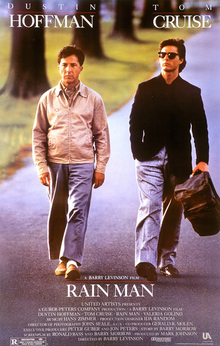| Rain Man | |
|---|---|
 Theatrical release poster by John Alvin | |
| Directed by | Barry Levinson |
| Screenplay by | |
| Story by | Barry Morrow |
| Produced by | Mark Johnson |
| Starring | |
| Cinematography | John Seale |
| Edited by | Stu Linder |
| Music by | Hans Zimmer |
Production companies |
|
| Distributed by | MGM/UA Communications Co. |
Release date |
|
Running time | 134 minutes[1] |
| Country | United States[1] |
| Language | English |
| Budget | $25 million[2] |
| Box office | $354.8 million[2][3] ($914 million in 2023 dollars)[4] |
Rain Man is a 1988 American road comedy-drama film directed by Barry Levinson and written by Barry Morrow and Ronald Bass. It tells the story of abrasive and selfish wheeler-dealer Charlie Babbitt (Tom Cruise), who discovers that his estranged father has died and bequeathed his multimillion-dollar estate to his other son, Raymond (Dustin Hoffman), an autistic savant whose existence Charlie was unaware of. Morrow created the character of Raymond after meeting real-life savant Kim Peek; his characterization was based on both Peek and Bill Sackter, a good friend of Morrow who was the subject of Bill, an earlier film that Morrow wrote.[5]
Rain Man competed at the 39th Berlin International Film Festival, where it won the highest prize: the Golden Bear.[6] The film was released theatrically by MGM/UA Communications Co. under the United Artists label in the United States on December 16, 1988, to critical and commercial success. Praise was given to Levinson's direction, the performances (particularly Cruise and Hoffman), the screenplay, the musical score, the cinematography, and the film's portrayal of autism. The film grossed $354 million on a $25 million budget, becoming the highest-grossing film of 1988, and received a leading eight nominations at the 61st Academy Awards, winning four (more than any other film nominated): Best Picture, Best Director, Best Actor (for Hoffman), and Best Original Screenplay.[7]
As of 2024[update], Rain Man is the only film to win both the Berlin International Film Festival's highest award and the Academy Award for Best Picture in the same year. It was also the last film released by Metro-Goldwyn-Mayer (MGM) to be nominated for Best Picture until Licorice Pizza in 2021; 33 years later.[8]
- ^ a b c d "Rain Man (1988)". AFI Catalog of Feature Films. Archived from the original on November 5, 2018. Retrieved November 5, 2018.
- ^ a b Cite error: The named reference
bomwas invoked but never defined (see the help page). - ^ "Rain Man (1988) - Financial Information". The Numbers.
- ^ 1634–1699: McCusker, J. J. (1997). How Much Is That in Real Money? A Historical Price Index for Use as a Deflator of Money Values in the Economy of the United States: Addenda et Corrigenda (PDF). American Antiquarian Society. 1700–1799: McCusker, J. J. (1992). How Much Is That in Real Money? A Historical Price Index for Use as a Deflator of Money Values in the Economy of the United States (PDF). American Antiquarian Society. 1800–present: Federal Reserve Bank of Minneapolis. "Consumer Price Index (estimate) 1800–". Retrieved February 29, 2024.
- ^ Barry Morrow's audio commentary for Rain Man from the DVD release.
- ^ "Berlinale: 1989 Prize Winners". berlinale.de. Archived from the original on June 9, 2019. Retrieved March 13, 2011.
- ^ Cite error: The named reference
Oscars1989was invoked but never defined (see the help page). - ^ Tartaglione, Nancy (February 9, 2022). "MGM's Michael de Luca & Pam Abdy on Studio's First In-House Best Picture Oscar Nomination in 33 Years, Being "Mildly Psychotically Obsessive" About Movies & What's Ahead – Q&A". Deadline Hollywood. Archived from the original on July 2, 2024.